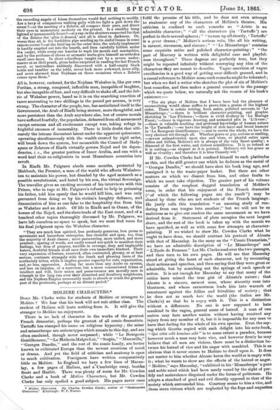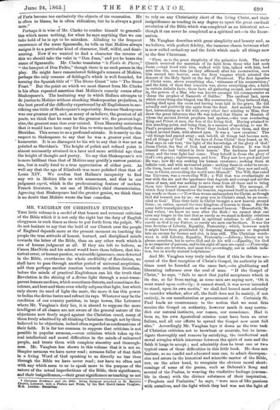MOLIERE CHARACTERS.* DOES Mr. Clarke write for students of Moliere
or strangers to Moliere ? We fear that his book will not suit either class. The student of Moliere will learn nothing from it. It will give the stranger to Moliere no enjoyment. -
There is no lack of character in the works of the greatest French dramatist, perhaps the greatest of all comic dramatists. Tartuffe has stamped his name on religious hypocrisy ; the miser and misanthrope are serious types which remain to this day, and are often emulated, though never surpassed ; while " Le Bourgeois Gentilhomme," "Le Medecin Malgre Lui," " Scapin," " Mascarille," " Georges Dandin," and the rest of the comic family, are better known to cultivated Europe than the newest creations of novel or drama. And yet the field of criticism and anatomy is open to much cultivation. Foreigners have written comparatively little on Moliere. In England we have a few lines of Macau- lay, a few pages of Hallam, and a Cambridge essay, besides Scott and Hazlitt. There was plenty of room for Mr. Cowden Clarke and a book of MoliZre Characters, but Mr. Cowden Clarke has only spoiled a good subject. His pages never once
• Lettere Characters. By Charles Cowden Clarke, author of "Shakespeare Characters." Edinburgh: W. P. Nunroo.
fulfil the promise of his title, and he does not even attempt to anatomize any of the characters of Moliere's theatre. His criticism is confined to such remarks as " Ariste is an admirable character ; " "all the characters (in Tartuffe ') are perfect in their several spheres ; " " to sum up all shortly, Tartuffe' is a great drama ; " Moliere's serious vein, like all his writing, is earnest, strenuous, and sincere ; " "' Le Misanthrope' contains some exquisite satire and polished character-painting ; " " the part of Mercury is written with delightful ease and playful- ness throughout." These dogmas are perfectly true, but they might be repeated infinitely without conveying any idea of the characters they are meant to describe. Vague assertion of vague excellencies is a good way of getting over difficult ground, and in a casual reference to Moliere some such remarks might be tolerated ; but when we find a writer who sketches the plot of six of Moliere's best comedies, and then makes a general comment in the passage which we quote below, we naturally ask the reason of his book's existence :—
" The six plays of Moliere that I have here had the pleasure of reconnoitring would alone suffice to prove him a genius of the highest order. There is sedate writing, keen satire, polished sarcasm, in Le Misanthrope ; ' —there is brilliant character-painting, and graphic sketching in 'Lea Fficheux; '—there is vivid drollery in 'Le Mariage Force; '—there is vigorous drawing, and animated plot in L'Avare ; ' — there is valuable teaching and profound knowledge of human nature in 'Le Tartuffe ; '—we have the height of rich farce and broad humour in 'Le Bourgeois Gentilhomme ; '—and to crown the whole, we have the very choicest wit through all. Whether grave or gay, serious or smiling, — severe animadversion upon sins and vices, or playful satire upon follies and foibles, Moliere's wit is always of the very finest quality; a diamond of the first water, and richest scintillation. It is as refined as it is cutting ;—as elegant as it is pointed. Moliere's wit has grace as well as vivacity; and therefore it is true Comedy-wit."
of Paris become too exclusively the objects of his veneration. He is often to blame, he is often ridiculous, but he is always a good man." • Perhaps it is wise of Mr. Clarke to confine himself to generali- ties which mean nothing, for when he says anything that we can take hold of he is apt to be mistaken. Alluding to the frequent recurrence of the name Sganarelle, he tells us that Moliere always assigns it to a particular kind of character, bluff, wilful, and domi- neering. Now if we wanted to find a character the reverse of this we should take the valet in " Don Juan," and yet he bears the name of Sganarelle. Mr. Clarke translates " le Patin de Pierre," " the banquet of Don Pedro," though there is no such person in the play. He might have remembered Schlegel's censure of Moliere, perhaps the only censure of Schlegel's which is well founded, for turning the Spanish title of " The Stone Guest " into The Stone Feast." But the point on which we most dissent from Mr. Clarke is his often repeated assertion that Moliere's comedy comes after Shakespeare's. The hesitating way in which Hallam attempts to do justice to Moliere without shocking Shakespearian prejudices, is the best proof of the difficulty experienced by all Englishmen in sac- rificing one tittle of Shakespeare's superiority. Because Shakespeare was our greatest poet, and, as many of us believe, the greatest of all poets, we think that he must be the greatest wit, the greatest logi- cian,the greatest man that ever existed. Even Macaulay maintains that it would have been easy for him to write more brilliantly than Sheridan. This seems to us a profound mistake. It is surely no dis- respect to Shakespeare to say that he was a greater poet than humourist. It is no disrespect to his wit to say that it was not as pointed as Sheridan's. The height of polish and refined point is almost necessarily attained in a later and more artificial age than the height of thought and poetry. To say that Shakespeare's wit is more brilliant than that of Moliere may gratify:a narrow patriot- ism, but is really fatal to a true appreciation of either poet. As well say that the age of Elizabeth was more polished than that of Louis XIV. We confess that Hallam's incapacity to find any wit in Moliere fills us with amazement, and that in our judgment esprit, which is the predominating feature of modern French literature, is not one of Moliere's chief characteristics. Agreeing that Shakespeare had the greater genius, we think there is no doubt that Moliere wrote the best comedies.































 Previous page
Previous page